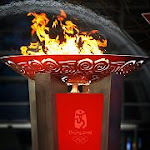
The Torch drives the Cadre's Tibet bully Hu to the arms of the Shogun Jr. Strange success. Two years ago the Cadre directed its angry youth to riot against Japan because of the war memorial fiasco. The cadre has no memory. It lives on the defensive. Score more successes for the Dalai Clique, apparently now running the Shogun Jr.
Hu's Visit to Japan May Help Ease Strains
China Tries to Polish
Image for Olympics;
Economic Ties Boom
By SEBASTIAN MOFFETT in Tokyo and JASON LEOW in Beijing
May 6, 2008 2:54 p.m.
Hu Jintao on Tuesday became the first Chinese president to visit Japan in 10 years, in a trip aimed at softening China's international image ahead of this summer's Olympic games.
The trip to Japan was arranged as part of a long campaign by Asia's biggest economic powers to fix their frayed relationship. The past decade has seen booming economic ties -- but also accusations by China that the Japanese weren't sufficiently sorry for their invasion of China in the 1930s, and a feeling by many Japanese that they were being unfairly picked on over this.
AP Photo/Japan Poo)
Chinese President Hu Jintao, right, and Japanese Prime Minister Yasuo Fukuda, left, head to a dinner Tuesday in Tokyo.
However, the two countries have tried over the past few years to forge better relations. China's military power is growing, making any potential flare-up more dangerous. And Japan's economy is getting a growth kick from exports of components, materials and machine tools to equip Chinese factories.
The trip has taken on a wider significance, however, as China is increasingly under fire for its handling of protests in Tibet, where clashes between Tibetan monks and Chinese security forces triggered violence. Tibetan exile groups say more than 200 people, mostly Tibetan, have been killed in the unrest, though the Chinese government has put the death toll at 22.
The Chinese government's treatment of Tibetan protesters prompted criticism from foreign governments and the Western media. That prompted some Chinese to boycott several Western conglomerates. As the Olympic flame was taken around the world on its way to Beijing, Chinese students demonstrated along parts of the route, turning out in droves with a sea of red Chinese flags.
But analysts say the Chinese leadership is now urgently looking to fix the country's image before the Olympics, which take place in August. Last week, Zhu Weiqun and Sitar, both vice ministers of the ruling Communist Party's policy-making body on religious and ethnic relations, met envoys of the Dalai Lama, the exiled Tibetan spiritual leader, in a bid to soften Beijing's image.
In addition, says Chen Gang, a research fellow at the East Asian Institute in Singapore, China's leaders might be trying to send a message to its own people -- that "we are now in a globalized era and we cannot have overly strong nationalism."
In a sign of the diplomatic task for Mr. Hu, hundreds of demonstrators turned out as he arrived in Tokyo to protest China's crackdown in Tibet.
Even so, better relations with an old enemy could help improve China's image, and Mr. Hu arrived in Japan full of goodwill. When Jiang Zemin visited Japan in 1998, he spoke sharply about the millions of Chinese killed by Japan's invasion last century. Relations worsened after Prime Minister Junichiro Koizumi publicly visited the controversial Yasukuni war shrine, which commemorates convicted war criminals as well as conscripted soldiers.
But Mr. Koizumi's successors have avoided Yasukuni, and current Prime Minister Yasuo Fukuda is known to be friendly toward China. Mr. Hu told Japanese reporters before his departure that the trip would be a "warm spring" for the countries.
Still, the two leaders are unlikely to get far with concrete issues, government officials indicated. They are at odds over gas exploration rights in disputed waters in the East China Sea. They have been arguing over the origin of pesticide found in February in some frozen dumplings exported from China to Japan, which hurt Chinese food exports to Japan.
Instead, Mr. Hu might be able to help replace a giant panda that died recently of heart failure at Tokyo's largest zoo. "It would be nice if we have a panda there again," Mr. Fukuda told reporters.
Write to Sebastian Moffett at sebastian.moffett@wsj.com and Jason Leow at jason.leow@wsj.com


No comments:
Post a Comment